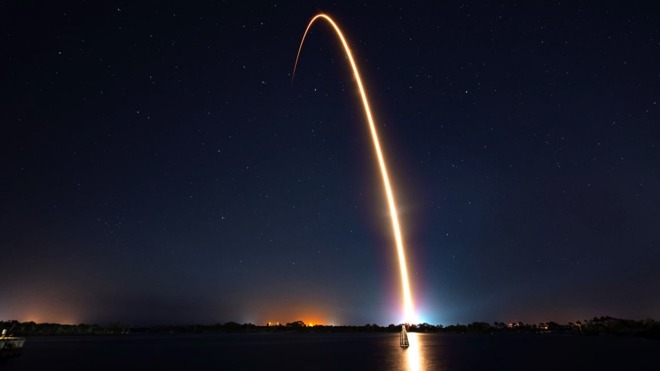Apple's satellite program aims to send data directly to an iPhone
Apple's satellite effort it began in 2017 may be starting to accelerate, with the company reportedly on a hiring spree to further its orbital ambitions.

SpaceX launch of some of the Starlink satellite constellation
Three recent hires after a 2017 program start highlight Apple's potential new focus. According to Bloomberg, Matt Ettus, Daneil Ellis, and Ashley Moore Williams have all come on board in the recent months.
Ettus formed wireless networking equipment company National Instruments Corp, and is presently leading the department after Greg Duffy's departure. Ellis is also reportedly attached to the initiative, after previously being one of the heads of Netflix's content delivery network. Williams comes from Aerospace Corp, a venue focused on communications satellites.
It isn't clear precisely what Apple is trying to accomplish, beyond sending data directly to an iPhone or iPad. It may decide to launch its own satellite constellation. An alternative, according to Friday's report from Bloomberg, is ground-based equipment to relay satellite data to users' devices.
The executives in charge of the program are John Fenwick, Google's ex-head of spacecraft operations, and Michael Trela, who was in charge of satellite engineering at Google. In February 2017, Google confirmed a deal to sell off its satellite mapping business, Terra Bella, to Planet Labs, which ultimately led to the departure of Fenwick and Trela for Apple.
The new hires were at one point co-founders of Skybox Imaging, a satellite imaging startup Google bought in 2014 for $500 million. It designed refigerator-sized satellites capable of producing detailed, rapidly-updated images of the Earth's surface.
It isn't yet clear if Apple wants to launch its own satellite cluster, which would provide it with proprietary data instead of having to rely on third parties. Boeing has allegedly talked to Apple about investing in a project to put over 1,000 satellites in low Earth orbit for expanding internet access, but it isn't clear how far the discussions went.
For Apple, satellite connectivity of some sort would presumably increase the appeal of its devices and services, guaranteeing access even in places normally cut off from broadband.
Bloomberg notes that the project is still in its early days, and "a clear direction and use for satellites hasn't been finalized."

SpaceX launch of some of the Starlink satellite constellation
Three recent hires after a 2017 program start highlight Apple's potential new focus. According to Bloomberg, Matt Ettus, Daneil Ellis, and Ashley Moore Williams have all come on board in the recent months.
Ettus formed wireless networking equipment company National Instruments Corp, and is presently leading the department after Greg Duffy's departure. Ellis is also reportedly attached to the initiative, after previously being one of the heads of Netflix's content delivery network. Williams comes from Aerospace Corp, a venue focused on communications satellites.
It isn't clear precisely what Apple is trying to accomplish, beyond sending data directly to an iPhone or iPad. It may decide to launch its own satellite constellation. An alternative, according to Friday's report from Bloomberg, is ground-based equipment to relay satellite data to users' devices.
The executives in charge of the program are John Fenwick, Google's ex-head of spacecraft operations, and Michael Trela, who was in charge of satellite engineering at Google. In February 2017, Google confirmed a deal to sell off its satellite mapping business, Terra Bella, to Planet Labs, which ultimately led to the departure of Fenwick and Trela for Apple.
The new hires were at one point co-founders of Skybox Imaging, a satellite imaging startup Google bought in 2014 for $500 million. It designed refigerator-sized satellites capable of producing detailed, rapidly-updated images of the Earth's surface.
It isn't yet clear if Apple wants to launch its own satellite cluster, which would provide it with proprietary data instead of having to rely on third parties. Boeing has allegedly talked to Apple about investing in a project to put over 1,000 satellites in low Earth orbit for expanding internet access, but it isn't clear how far the discussions went.
For Apple, satellite connectivity of some sort would presumably increase the appeal of its devices and services, guaranteeing access even in places normally cut off from broadband.
Bloomberg notes that the project is still in its early days, and "a clear direction and use for satellites hasn't been finalized."

Comments
https://www.patentlyapple.com/patently-apple/2013/02/apples-satellite-phone-patent-could-technically-apply-to-tv.html
As for the downlink vs. uplink theory, as a general rule, power availability is severely constrained in a satellite too. Not just because the size (and weight) of bigger solar panels, but mostly due to poor heat dissipation. Up there, the only heat dissipation phenomena available is irradiation, which is quite inefficient. You just can't run your electronics on many watts, or they'll simply burn up!
https://spacenews.com/spacex-gets-ok-to-re-space-starlink-orbits/
https://www.teslarati.com/spacex-starlink-internet-satellite-constellation-expands/
Amazon is also hiring former Google satellite execs and actively working on a launch of their own satellite system, while Google themselves who were originally planning their own are now a backer of Starlink from what I read and contributing some of their pertinent engineering and IP to the project as well as backing One Web. Add to that other companies currently launching at least the beginnings of their own satellite internet services, and still others will likely be somewhere in the mix too.
https://www.cnbc.com/2019/12/14/spacex-oneweb-and-amazon-to-launch-thousands-more-satellites-in-2020s.html
I can't imagine the work that must be done simply to avoid the current sats during other launches including something like resupplying the Space Station much less the thousands more that will added within coming months.
EDIT: Check out this history Wiki, what a mess:
https://en.wikipedia.org/wiki/OneWeb_satellite_constellation
also have less internet lag.
The Verge:
Why astronomers are worried that SpaceX’s satellite network will pollute the night sky
They’re bright in the sky, and that’s a problem
https://www.theverge.com/2019/5/29/18642577/spacex-starlink-satellite-constellation-astronomy-light-pollution
SpaceX will own this space having the launch equipment and home build satellites.
AppleCar 2